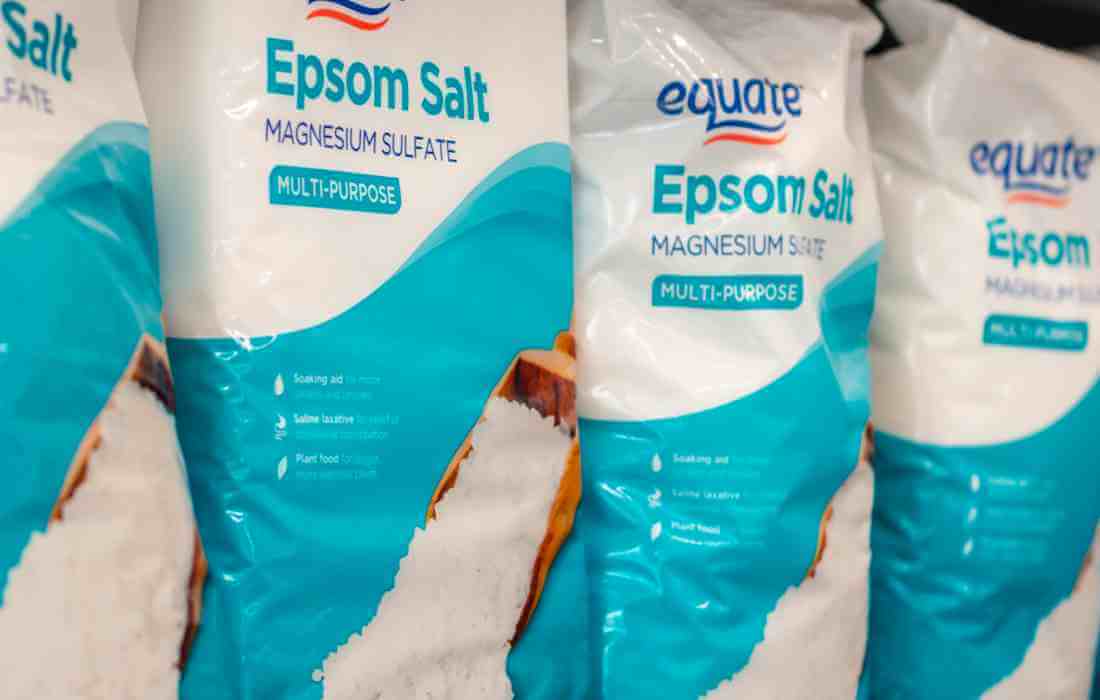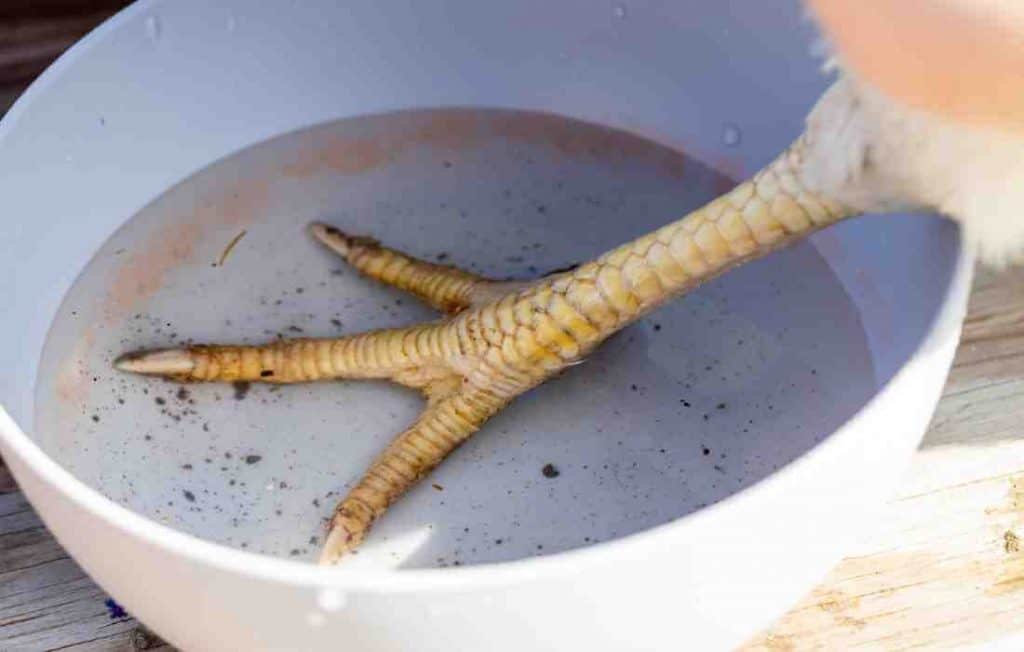We all know the benefits of Epsom salt baths. We use them to relax, de-stress, and relieve aches and pains. We can also consume Epsom salt to alleviate constipation and gastrointestinal issues. Chickens also can suffer from these same problems. So, what about chickens? Can they drink Epsom salt water too?
Can Chickens Drink Epsom Salt Water
It is safe for chickens to eat, drink, or bathe in it. The magnesium sulfate compound can be used both internally and externally. It can help treat pain, reduce stress and fatigue, relieve diarrhea, constipation, treat skin conditions, and improve circulatory health.
We’ll look at how to help your chicken with Epsom salt, how to use it, issues you may face, and why many chicken owners have started using it as a therapeutic.

What Is Epsom Salt?
Many people think it is table salt, but that is far from the truth!
Epsom salt is a natural chemical compound called magnesium sulfate.
Magnesium sulfate is known for improving circulatory health and reducing stress, but it is also an FDA-approved laxative.
It got its name from the underground spring it was found in the English town of Surrey, England. It was founded in the early 17th century, and today Epsom salt is used as a health and beauty aid.
Is Epsom Salt Water Safe For Chickens

Eating or drinking small amounts of Epsom salt is generally safe when given in the right dosage. Like us, chickens can get relief from several different ailments such as:
Diarrhea and Constipation Relief
When given orally, the magnesium helps provide relief from both constipation and diarrhea. Chicken’s tend to eat everything, from bugs, insects, food scraps, vegetables, and fruit.
Their unique diet can cause them to become constipated, to the point where they cannot lay eggs. An Epsom salt bath or small dosage in their regular drinking water can help provide some relief.
That said, never give your chickens too much. Otherwise, it can have adverse effects. It isn’t something you want to feed to your chickens regularly.
Egg-Bound Hens
Egg binding (difficulty passing an egg) is common in chickens when consuming a high protein diet, and other issues. The egg gets stuck inside the chicken because it’s too big, turned sideways, or is blocking the hole.
It’s not only a scary situation for both you and the chicken but can be fatal, especially if the egg breaks inside the hen. Your first reaction is to contact your avian vet, but that’s not always possible.
Many backyard chicken owners have been able to treat the problem themselves by soaking the hen in a warm Epsom salt bath for 10-20 minutes to help the muscles relax. With the muscles relaxed, the egg will drop.
Anti-Anxiety
The magnesium compound increases the serotonin hormone responsible for both happiness and relaxation production of the brain. The Serotonin hydroxytryptamine (5-HT) plays a crucial role in your poultry’s temperament, stress, painful stimuli, and sexual behavior. (source)
When things aren’t working the way they should be, it could lead to psychopathological behaviors such as pecking other chickens, feather pecking, etc.
An Epsom salt water bath can help a chicken relax in the same way that it helps us. Not only that, but studies have shown that magnesium increases serotonin.
Skin Conditions
Epsom salt is used as a beauty aid because it can helps alleviate dry, rough skin, and exfoliate dry skin cells. It can also help soothe skin affected by skin conditions, even in chickens.
Bumblefoot is a common skin condition that occurs on the toes, hocks, and pads of a chicken’s foot. If caught early, you can soak the lesion in a warm Epsom salt bath to soften the exterior.
Once softened, you can remove the plug with gloved hands. The plug consists of dead tissue and other exudate (similar to a scab) that develops when the foot’s pad attempts to heal.
Apply some Neosporin to the bottom of the footpad to help it heal. You may want to wrap the foot to prevent it from getting dirty, but not too tight to cut off the circulation.
Lastly, separate the chicken from the rest of the flock until completely healed.
This video will walk you through the entire process of treating bumblefoot without surgery.
You can also use Epsom salt to treat botulism in chickens. Before starting any home treatment, it’s best to seek medical advice.
What Are The Benefits Of Epsom Salt Water
Epsom salt water is used for many ailments your chickens face. Almost everything Epsom salt does for us, it also does for our chickens. Bathing your chickens in Epsom salt can speed the healing process of skin conditions while also reducing stress.
Epsom salt is primarily used orally as a laxative but can be given to chickens to detoxify their system and can also help shorten the life of a yeast infection. Because it’s an FDA-approved laxative, it can be used to relieve your chicken’s constipation.
Epsom salt causes an increase of water in the intestines, flushing out anything you think could be bothering their gastrointestinal system, like an unwanted or toxic food choice.
Magnesium sulfate (Epsom salt) is also good for your chicken’s circulatory system, muscles, and nerves. Chickens need about 400mg of magnesium daily, although this should be accounted for in their daily diet.
When To Give A Chicken Epsom Salt Water
Epsom salt baths can be given after stressful situations or if you notice and general unwellness in your chicken. Symptoms that may improve with an Epsom salt bath include skin conditions, aches, pains, and stress.
Epsom salt should be administered orally if you notice constipation, diarrhea, or loss of appetite in your chicken. Chicken and Chicks Info claims that this could indicate a gastrointestinal issue curable by regular Epsom salt administration.
Make sure to consult your vet if you notice any of these symptoms consistently. It could mean another health problem going on that you can’t see, and it should be adequately addressed to ensure your chicken’s health.
How To Give A Chicken Epsom Salt Water
To make Epsom saltwater, you will need Epsom salt (it could be labeled magnesium sulfate), with no added fragrances or dyes, and a measuring cup. Mix 1 teaspoon of Epsom salt for every 1 cup of water.
To give a chicken Epsom salt water, you will need a medical syringe; these can be found at most drug stores or supermarkets. Garden Betty wraps her chickens in a towel, making sure their wings are at their side, to ensure that they are comfortable and less likely to stress. Take the syringe and gently push it into your chicken’s mouth at the side of their beak.
Gently squeeze the Epsom salt solution into their mouth, making sure not to shoot it too hard as it could go directly into your chicken’s lungs. Do this until the syringe is empty.
If you notice your chicken hasn’t been drinking as much, you can also mix the Epsom salt into coconut water to provide some extra electrolytes.
Repeat this once or twice a day for no more than 3-4 days. If your chickens don’t improve within this time frame, you may need to try something else or seek your veterinarian’s help.
If your whole flock is experiencing symptoms, you can add one teaspoon of Epsom salt per 1 cup of water to their regular drinking water.
Final Word
Epsom salt water is safe and even good for your chicken to consume regularly. It can be administered orally or used as a therapeutic bath.
Epsom salt water is primarily used as a laxative and can be used to relieve your chicken’s constipation or flush out its system.
Epsom salt works just as good for our chickens as it does for us!
Related Articles